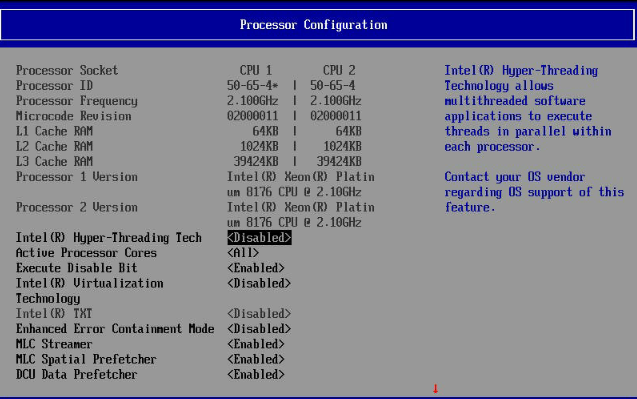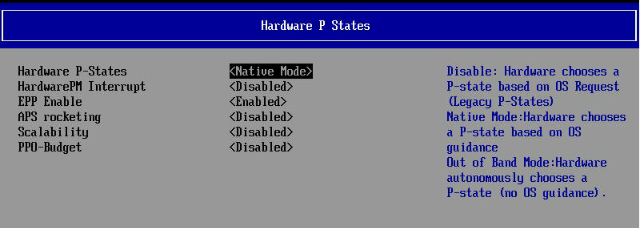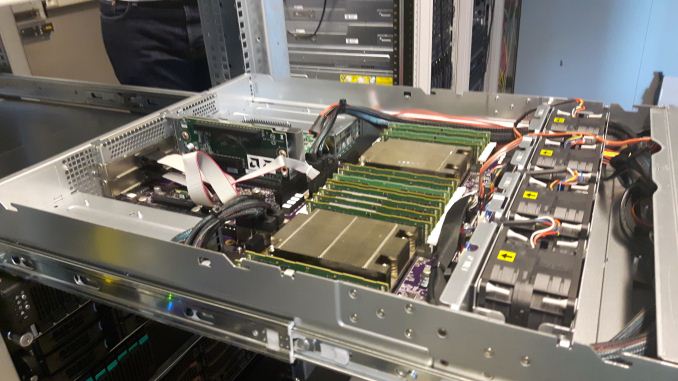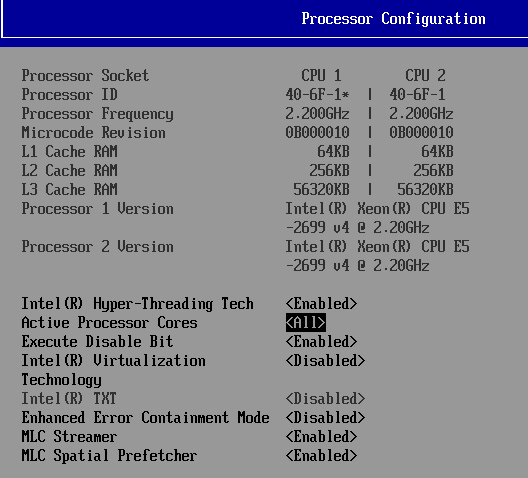Sizing Up Servers: Intel's Skylake-SP Xeon versus AMD's EPYC 7000 - The Server CPU Battle of the Decade?
by Johan De Gelas & Ian Cutress on July 11, 2017 12:15 PM EST- Posted in
- CPUs
- AMD
- Intel
- Xeon
- Enterprise
- Skylake
- Zen
- Naples
- Skylake-SP
- EPYC
Testing Notes
For the EPYC launch, AMD sent us their best SKU: the EPYC 7601. Meanwhile Intel gave us a choice between the top bin Xeon 8180 and the Xeon 8176. Considering that the latter had 165-173W TDP, similar to AMD's best EPYC, we felt that the Xeon 8176 was the best choice.
Unfortunately, our time testing the two platforms has been limited. In particular, we only received AMD's EPYC system last week, and the company did not put an embargo on the results. This means that we can release the data now, in time to compare it to the new Skylake-SP Xeons, however it also means that we've only had a handful of days to work with the platform before writing all of this up for today's embargo. We're confident in the data, but it means that we haven't had a chance to tease out the nuances of EPYC quite yet, and that will have to be something we get to in a future article.
Meanwhile we should note that we've had to retire the bulk of our historical benchmark data, as we upgraded both our compiler and OS (see below). Due to this, we only had a very limited amount of time to run additional systems, and for that reason we've opted include Intel's Xeon E5-2690. The Sandy Bridge-EP processor is about 5 years old, and for customers who aren't upgrading their servers every single generation, it's these servers that we believe are most likely to get upgraded in this round. So for server managers looking at finally buying into new hardware, you can get an idea of much return of investment you get.
Benchmark Configuration and Methodology
All of our testing was conducted on Ubuntu Server "Xenial" 16.04.2 LTS (Linux kernel 4.4.0 64 bit). The compiler that ships with this distribution is GCC 5.4.0.
You will notice that the DRAM capacity varies among our server configurations. The reason is that we had little time left before today's launch embargo. Removing any hardware is always a risk, so we decided to run our tests without significantly changing the internal hardware of the systems we received from AMD and Intel (SSDs were still replaced). As far as we know, all of our tests fit in 128 GB, so DRAM capacity should not have much influence on performance. But it wil have a impact on total energy consumption, which we will discuss.
Last but not least, we want to note how the performance graphs have been color-coded. Orange is AMD's EPYC, dark blue is Intel's best (Skylake-SP), and light blue is the previous generation Xeons (Xeon E5-v4) . Gray has been used for the soon-to-be-replaced Xeon v1.
Intel's Xeon "Purley" Server – S2P2SY3Q (2U Chassis)
| CPU | Two Intel Xeon Platinum 8176 (2.1 GHz, 28c, 38.5MB L3, 165W) |
| RAM | 384 GB (12x32 GB) Hynix DDR4-2666 |
| Internal Disks | SAMSUNG MZ7LM240 (bootdisk) Intel SSD3710 800 GB (data) |
| Motherboard | Intel S2600WF (Wolf Pass baseboard) |
| Chipset | Intel Wellsburg B0 |
| BIOS version | 9/02/2017 |
| PSU | 1100W PSU (80+ Platinum) |
The typical BIOS settings can be seen below; we enabled hyperthreading and Intel virtualization.
AMD EPYC 7601 – (2U Chassis)
Five years after our "Piledriver review", a new AMD server arrives in the Sizing Servers Lab.
| CPU | Two EPYC 7601 (2.2 GHz, 32c, 8x8MB L3, 180W) |
| RAM | 512 GB (16x32 GB) Samsung DDR4-2666 @2400 |
| Internal Disks | SAMSUNG MZ7LM240 (bootdisk) Intel SSD3710 800 GB (data) |
| Motherboard | AMD Speedway |
| BIOS version | To check. |
| PSU | 1100W PSU (80+ Platinum) |
Intel's Xeon E5 Server – S2600WT (2U Chassis)
| CPU | Two Intel Xeon processor E5-2699v4 (2.2 GHz, 22c, 55MB L3, 145W) Two Intel Xeon processor E5-2690v3 (2.3 GHz, 14c, 35MB L3, 120W) |
| RAM | 256 GB (16x16GB) Kingston DDR-2400 |
| Internal Disks | SAMSUNG MZ7LM240 (bootdisk) Intel SSD3700 800 GB (data) |
| Motherboard | Intel Server Board Wildcat Pass |
| BIOS version | 1/28/2016 |
| PSU | Delta Electronics 750W DPS-750XB A (80+ Platinum) |
The typical BIOS settings can be seen below.
HP-G8 (2U Chassis) - Xeon E5-2690
| CPU | Two Intel Xeon processor E5-2690 (2.9GHz, 8c, 20MB L3, 135W) |
| RAM | 512 GB (16x32GB) Samsung DDR-3 LR-DIMM 1866 MHz @ 1333 MHz |
| Internal Disks | SAMSUNG MZ7LM240 (bootdisk) Intel SSD3700 800 GB (data) |
| Motherboard | HP G8 |
| BIOS version | 9/23/2016 |
| PSU | HP 750W (Gold) |
Other Notes
Both servers are fed by a standard European 230V (16 Amps max.) power line. The room temperature is monitored and kept at 23°C by our Airwell CRACs.














219 Comments
View All Comments
ddriver - Tuesday, July 11, 2017 - link
Gotta love the "you don't care about the xeon prices" part thou. Now that intel don't have a performance advantage, and their product value at the high end is half that of amd, AT plays the "intel is the better brand" card. So expected...OZRN - Wednesday, July 12, 2017 - link
You need some perspective. Database licensing for Oracle happens per core, where Intel's performance is frequently better in a straight line and since they achieve it on lower core count it's actually better value for the use case. Higher per-CPU cost is not so much of a concern when you pay twice as much for a processor license to cover those cores.I'm an AMD fan and I made this account just for you, sweetheart, but don't blind yourself to the truth just because Intel has a history of shady business. In most regards this is a balanced review, and where it isn't, they tell you why it might not be. Chill out.
ddriver - Thursday, July 13, 2017 - link
You are such a clown. Nobody, I repeat, NOBODY on this planet uses 64 core 128 thread 512 gigabytes of ram servers to run a few MB worth of database. You telling me to get pespective thus can mean only two things, that you are a buthurt intel fanboy troll or that you are in serious need of head examination. Or maybe even both. At any rate, that perfectly explains your ridiculously low standards for "balanced review".Notmyusualid - Friday, July 14, 2017 - link
It seems no matter what opinion someone presents that might exhibit Intel in a better light - you are going to hate it anyway.What a life you must lead.
OZRN - Friday, July 14, 2017 - link
No, they don't. They use them to host gigabytes to terabytes worth of mission critical databases, with specified amounts of cores dedicated to seperate environments of hard partitioned data manipulation. I've done some quick math for you and in an average setup of Enterprise Edition of Oracle DB, with only the usually reported options and extras, this type of database would cost over $3.7m to run on *64 cores alone*. At this point, where is your hardware sunk costs argument?Also, I don't think anyone here is impressed by your ability to immediately personally insult people making valid points. Good luck finding your head that deep in your colon.
CajunArson - Tuesday, July 11, 2017 - link
"All of our testing was conducted on Ubuntu Server "Xenial" 16.04.2 LTS (Linux kernel 4.4.0 64 bit). The compiler that ships with this distribution is GCC 5.4.0."I'd recommend using a more updated distro and especially a more up to date compiler (GCC 5.4 is only a bug-fix release of a compiler from *2015*) if you want to see what these parts are truly capable of.
Phoronix does heavy-duty Linux reviews and got some major performance boosts on the i9 7900X simply by using up to date distros: http://www.phoronix.com/scan.php?page=article&...
Considering that Purley is just an upscaled version of the i9 7900X, I wouldn't be surprised to see different results.
CajunArson - Tuesday, July 11, 2017 - link
As a followup to my earlier comment, that Phoronix story, for example, shows a speedup factor of almost 5X on the C-ray benchmark simply by using a modern distro with some tuning for the more modern Skylake architecture.I'm not saying Purley would have a 5X speedup on C-ray per-say, but I'd be shocked if it didn't get a good boost using modern software that's actually designed for the Skylake architecture.
CoachAub - Wednesday, July 12, 2017 - link
Keywords: "actually designed for the Skylake architecture". Will there be optimizations for AMD Epyc chips?mkozakewich - Friday, July 14, 2017 - link
If it's a reasonable optimization, it makes sense to include it in the benchmark. If I were building these systems, I'd want to see benchmarks that resembled as closely as possible my company's workflow. (Which may be for older software or newer software; neither are inherently more relevant, though benchmarks on newer software will usually be relevant further into the future.)CajunArson - Tuesday, July 11, 2017 - link
And another followup: The time kernel compilation on the i9 7900X got almost a factor of 2 speedup over the Ubuntu 16.04 using more modern distros.